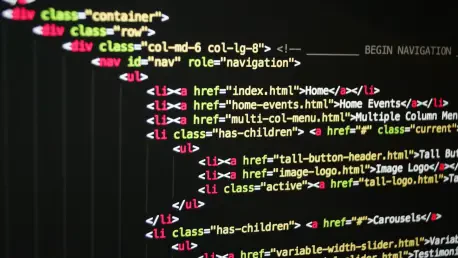Microsoft has taken a bold step in the tech landscape by openly distributing the GitHub Copilot Chat extension of Visual Studio Code under the MIT license. This move marks a significant shift, revealing the intricacies of artificial intelligence (AI)-powered coding mechanisms and fostering a transformation within the developer community. This decision highlights the ongoing evolution of software development methodologies, redefining how developers engage with AI tools. By dismantling the traditional, closed-source approach and embracing transparency, Microsoft sets a precedent for industry peers, reshaping the way AI tools are developed and deployed. The open-sourcing of these components underscores a pivotal moment, suggesting profound changes in AI tool adoption, collaboration, and community engagement in coding environments. As Microsoft champions transparency, the entire developer ecosystem stands to be impacted, bridging the past with a future where AI is not just an enabler but a collaborative partner in software innovation.
A New Era of Transparency and Community Involvement
At the heart of this initiative is a commitment to transparency, as demonstrated by Microsoft’s decision to reveal the inner workings of the GitHub Copilot Chat extension. This move represents a fundamental shift towards open-source methodologies, empowering developers to gain insights into AI coding assistants that have traditionally been shrouded in secrecy. By providing access to the underpinnings of AI-driven functionalities, developers are poised to gain a deeper understanding of agent mode capabilities, how context is presented to large language models, and optimal prompt engineering practices. This transparency is a watershed moment, transforming the perception of AI-assisted coding from a mysterious process to one that invites scrutiny, enhancement, and innovation.
Community-driven innovation emerges as a central element of this open-source strategy. Recognizing the invaluable contributions of the developer community, Microsoft extends its collaborative model to AI features within Visual Studio Code. This approach encourages developers worldwide to contribute, identify areas for improvement, and customize AI functionalities to address specific needs. The open-source community, known for its collective problem-solving prowess, is now empowered to further refine AI tools, potentially surpassing the efforts of individual, resource-rich organizations. By leveraging global contributions, Microsoft aims to harness this collaborative spirit, fostering an environment where AI-driven capabilities are continuously improved and tailored to user requirements.
Shifts in Tech Industry Trends
Microsoft’s decision aligns with a broader shift towards open-source and transparent AI tool development within the technology industry. This approach challenges the traditional closed-source model, which often results in uncomfortable dependencies for many organizations. By choosing transparency, Microsoft places pressure on other AI tool providers to follow suit, setting a new standard for industry innovation. Additionally, integrating previously separate AI functionalities directly into Visual Studio Code’s core, rather than maintaining them as standalone extensions, reflects a strategic architectural vision. This integration ensures that AI becomes a central component of the editor, bolstering the long-term efficacy and accessibility of AI capabilities within the platform. Such an approach underscores Microsoft’s dedication to embedding AI functionalities as a fundamental aspect of its software offering, rather than treating them as merely peripheral enhancements.
With the integration of AI tools into the core of Visual Studio Code, Microsoft is paving the way for sustainable, long-term AI capabilities. This shift highlights a thoughtful strategy aimed at ensuring AI features are seamlessly incorporated into everyday development practices. By making AI an integral part of the platform, rather than an isolated addition, Microsoft is facilitating greater accessibility and utility for developers. This strategic alignment reflects an industry trend where AI is not just an adjunct to development processes but becomes an essential tool for increasing efficiency and innovation in software programming. By prioritizing transparency and core integration, Microsoft exemplifies a forward-thinking approach that could influence future software development paradigms.
Implications and Industry Consensus
The open-sourcing of GitHub Copilot Chat carries significant implications for both individual developers and development teams. For teams, the ability to audit AI functionalities enhances their capacity to meet security and compliance requirements, which is invaluable for organizations with rigorous data governance policies. With transparency, teams can scrutinize the data transferred to language models and adjust the extensions’ behavior according to organizational guidelines, ensuring alignment with company standards. Through this openness, Microsoft addresses concerns related to data privacy and security, offering organizations greater control over AI integration within their development environments.
Individual developers also benefit from this transparency, gaining the ability to delve into system prompts and implementation details. This access empowers developers to engage in more effective prompt engineering, transforming AI tools from unpredictable to reliable assets that can systematically enhance productivity. The newfound transparency fosters trust between developers and AI tools, ensuring that AI capabilities are leveraged optimally to manage increased workloads. Educational institutions and researchers stand to gain immensely, utilizing real-world AI implementations to advance academic knowledge. This new level of access allows them to teach prompt engineering and system integration, while also examining these systems for potential vulnerabilities or biases that may need addressing.
Challenges and Future Prospects
Microsoft’s audacious move to distribute the GitHub Copilot Chat extension for Visual Studio Code under the MIT license represents a pivotal moment in the tech landscape, particularly in software development. This decision reveals the complexities of AI-driven coding processes, signaling a transformation in how developers interact with AI technologies. By moving away from the conventional closed-source model, Microsoft fosters transparency, setting a new industry standard that could influence its peers. This shift may profoundly impact the adoption, collaboration, and community engagement surrounding AI tools within coding environments. Through this open-source approach, Microsoft promotes transparency, potentially reshaping how AI is integrated as a collaborative partner in software innovation. The decision acknowledges the evolution of development methods and foreshadows a future where AI not only enables but actively participates in creating software solutions, bridging traditional methodologies with modern, dynamic tools.









